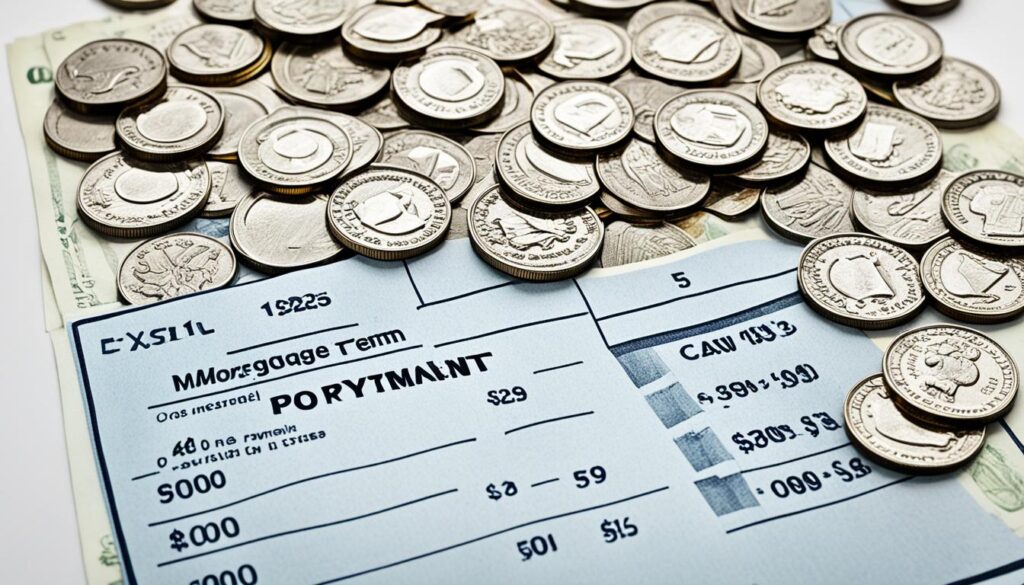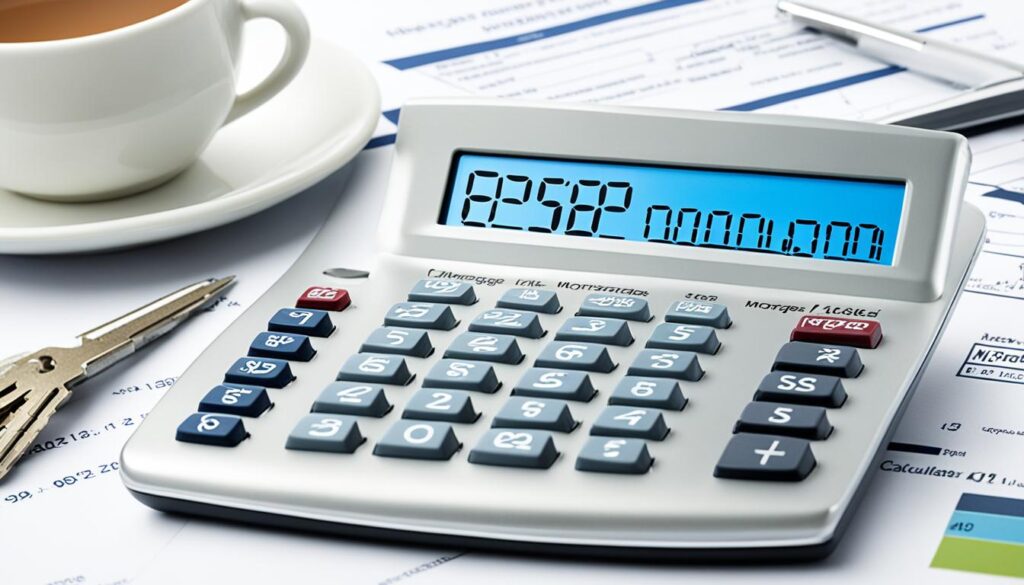Mortgage loan is a big deal. It’s likely to be the biggest loan you’ll ever take out. You do this to purchase the biggest thing you’ll ever own – your home. Understanding how a mortgage works is key. It helps you pick the mortgage that’s best for you, whether you’re new to buying homes or an old hand at it. Now, dealing with home mortgage loans and finding the best mortgage options can feel tough. But, tools like a mortgage calculator can make things easier. They let you figure out what you might pay each month. Because the right mortgage is crucial for your financial health.
Private mortgage insurance and the different types of mortgage loans are also important to know about. A mortgage calculator doesn’t just help you with monthly estimates. It also aids in choosing a right mortgage for you.
Starting your path to homeownership is exciting. But, you need to know the mortgage process. This includes getting pre-approved and applying for a loan. Plus, making sure you get the best current mortgage rates is essential. You’ll also have to manage your monthly income well. This is to make sure you can handle your new mortgage smoothly. If it’s your first time getting a mortgage or you’re refinancing, understanding the loan costs and percent of the loan amount is important. The loan closing date plays a big role too. Knowing these things will help you reach your goal of owning a home.
Key Takeaways: Mortgage loan
- A mortgage loan is a long-term way to buy a home, often the biggest thing you’ll ever own.
- Getting how mortgages work, like the different types of mortgage loans, is crucial. It lets you pick the right mortgage for your wallet.
- Using a mortgage calculator is smart. It helps to figure out your monthly payments. This way, you can plan ahead.
- Navigating the mortgage process is smoother with help from a mortgage loan officer or mortgage broker.
- Your credit report, debt-to-income ratio, and down payment are key. They can help you get the best mortgage loan and interest rate.
Understanding Mortgages
A mortgage is a loan for buying a home. You borrow money from a lender and agree to pay it back with interest. The house is used as collateral, so if you don’t pay, the bank can take it. This loan is only called a mortgage once it’s tied to your house, showing you must pay it or risk losing your home.
Also Read : Vehicle Loan: How Can You Secure The Best Interest Rate?
What is a Mortgage?
A mortgage is how you buy a house using a loan. The lender gives you money to buy the home. You then pay back this money, plus interest, over usually 15 or 30 years.
How a Mortgage Works
Taking out a mortgage means you and the lender make a deal. The lender gives you the money for the house. You promise to make monthly payments including principal (the loan amount) and interest until you fully repay the loan. The house is the collateral. This means the lender can take it if you don’t pay.
Also Read : Empowering Health Through Medical Research: Shaping The Future Of Medicine
Common Mortgage Terms
It’s important to know these mortgage terms:
- Principal: The original loan amount, not including interest.
- Interest: Charges by the lender for loaning the money.
- Taxes: Included in your monthly mortgage payment.
- Insurance: Part of your monthly mortgage payment for home coverage.
How a Mortgage Works

Every month, you pay a monthly mortgage payment. This payment is split into principal, interest, taxes, and insurance. These make up your PITI.
Also Read : Breaking Barriers In Medical Research: A Journey Of Discovery And Hope
Principal
The principal part of your monthly payment reduces your loan amount. It’s the money you borrowed to buy your home. Over time, this part gets bigger, and the interest part gets smaller.
Interest
The interest you pay is the cost of borrowing money. Interest rates can change but are often fixed for the loan’s life. How much interest you pay affects the total cost of the loan.
Taxes
The taxes part of your monthly payment is for your property taxes. You pay these to your local government. The amount can change over time, affecting your payment.
Insurance
The insurance part of your monthly payment is for protecting your home. It covers damage and theft for your belongings. If your down payment is low, you might need private mortgage insurance.
Knowing where your monthly payment goes helps in budgeting. It makes you aware of your home ownership costs. This knowledge can also guide you in reducing payments. For example, by increasing your down payment or refinancing your loan.
Also Read : Smart Money Moves: Strategies For Student Loan Repayment Success
How to Qualify for a Mortgage

To get a mortgage, you must meet certain lender criteria. They will look at Your Credit Score Your credit score is very important. It shows your ability to take on debt. A higher score means better mortgage offers.
Also Read : Unveiling Tomorrow’s Cures: Medical Research in the Digital Age
Your Debt-to-Income Ratio
The debt-to-income ratio measures your debts against your income. Lower ratios suggest you can handle a mortgage well.
Your Down Payment
Your down payment size matters too. Bigger down payments lead to better loan terms. For example, 20% down can skip private mortgage insurance.
Your Rainy-Day Reserves
Saving for the unexpected is smart. Lenders want to know you’re financially solid. These rainy-day reserves help show that.
Your Property Type
What you’re buying is crucial. If it’s your home, a condo, or an investment, it affects your loan options and conditions.
Your Occupancy Plans
How you’ll use the property matters too. Being a home, second home, or for investment impacts your mortgage details.
Knowing about these aspects can ready you for a mortgage application. It can enhance your path to securing a mortgage for your future home, or to refinance.
Mortgage Loan

A mortgage loan helps you buy a home, land, or real estate. You agree to pay back the lender over time. This is done through regular payments of principal and interest. The home or land is used as collateral against the loan.
When getting a mortgage loan, consider the loan amount and type. Also think about the term and any special loan options. Lenders check if you can get the loan based on your credit score, income, and what you own.
Don’t forget the loan closing date and the type of loan program. You must fill out a loan application. Then, give details about your current loan and finances. This helps you get better loan terms. Most people look at the cost of the loan and the interest rate first. They want a mortgage loan that meets their financial needs and is affordable.
Types of Mortgages

When buying a home, you can pick from various mortgage types. You’ll find fixed-rate mortgages to adjustable-rate mortgages, interest-only loans, and reverse mortgages. It’s key to know what each one offers to choose the best for your needs and goals.
Fixed-Rate Mortgages
A fixed-rate mortgage keeps your interest rate steady for the loan’s life. This means your monthly payments won’t change. Homebuyers who plan to live in their home long term often choose these.
Adjustable-Rate Mortgages (ARMs)
ARMs have interest rates that start low but might rise later. This could mean lower initial monthly payments than fixed-rate mortgages. However, your payments could go up if the interest rate does.
Interest-Only Loans
With interest-only loans, you only pay the interest for an initial period, usually 5 to 10 years. Then, you start paying the loan’s principal too. This type might work well if you know your income will rise, or you’ll only keep your home for a short time.
Reverse Mortgages
Reverse mortgages are for those 62 and older, letting them use their home equity for cash. You get money as a lump sum, line of credit, or monthly. Plus, you don’t need to repay it until you move, sell the home, or pass away.
Average Mortgage Rates
The mortgage rates you find can change a lot depending on a few key things. This includes the type of mortgage you choose, the length of the loan, any discount points you pay, and how high the interest rates are at that moment. These factors all play a big role in how much you pay each month and the whole loan cost.
Interest rates for mortgages go up and down often and can be different from every lender. It’s wise to look at many options to find the best deal for your budget. A useful tool is an online mortgage calculator. It can give you an idea of what your mortgage payment might be and how much you’ll pay in interest over the loan’s time.
Wanting to buy a new house, refinance your current home loan, or explore special loans like a VA loan means you need to know about mortgage rates. This is a key first step in the buying or refinancing journey.
How to Compare Mortgages

In the past, mortgages mainly came from banks, savings and loan, and credit unions. But now, there are also nonbank lenders like Better, loan Depot, Rocket Mortgage, and SoFi. This gives more home loan options to people looking for real estate lending.
It’s key to know the differences between conventional mortgages, FHA, VA, USDA, and jumbo loans. Using a mortgage calculator can show you your monthly payments. Also, many experts, like mortgage brokers and lenders, offer free tools to help.
Knowing about different mortgage types and figuring out your monthly costs is smart. It helps you choose the right mortgage fit for your budget and home goals.
Why Do People Need Mortgages?
Most homes cost more than what people have saved. Mortgages help by letting buyers borrow money. This way, you can get your first Home or buy or refinance a home. Even if the home price is high, a mortgage makes it possible to become a homeowner.
There are many types of mortgages like fixed-rate or adjustable-rate mortgage (ARM). Which you pick depends on things like your Credit score and how much you can pay each month. Lenders use tools like a mortgage calculator to figure out what you can afford. They consider the interest rate and other fees too.
Mortgages let more people own homes. You can purchase a home or refinance a home to get a better interest rate. The key is finding a monthly payment and loan term that fits your budget. While getting a mortgage can be tricky, owning your home is worth it to many homebuyers.
Also Read: Funding Your Future: Comprehensive Student Loan Options
FAQs
Q: What is a mortgage loan?
A: A mortgage loan is a type of loan that is used to purchase a home or real estate property. The borrower agrees to repay the loan amount plus interest over a specified period of time.
Q: How does a mortgage loan work?
A: When you take out a mortgage loan, the lender provides you with the funds needed to buy a home. You then make regular monthly payments to the lender, which include both the principal amount borrowed and the interest accrued.
Q: What factors determine the interest rate on a mortgage loan?
A: The interest rate on a mortgage loan is determined by factors such as the borrower’s credit score, the loan amount, the loan term, and the current market conditions.
Q: What is a mortgage calculator and how can it help?
A: A mortgage calculator is a tool that helps you estimate your monthly mortgage payments based on factors like loan amount, interest rate, and loan term. It can help you plan your budget and determine how much you can afford to borrow.
Q: What are the different types of mortgage loans available?
A: Some common types of mortgage loans include FHA loans, conventional loans, fixed-rate loans, and adjustable-rate loans. Each type of loan has its own requirements and terms.
Q: What is the role of a mortgage lender in the loan process?
A: A mortgage lender is a financial institution or individual that provides funding for a mortgage loan. They evaluate your financial situation, process your loan application, and ultimately approve or deny your loan request.
Q: How can I refinance my mortgage?
A: To refinance your mortgage, you would apply for a new loan to pay off your existing mortgage. Refinancing may help you obtain a lower interest rate, reduce your monthly payments, or change the term of your loan.
